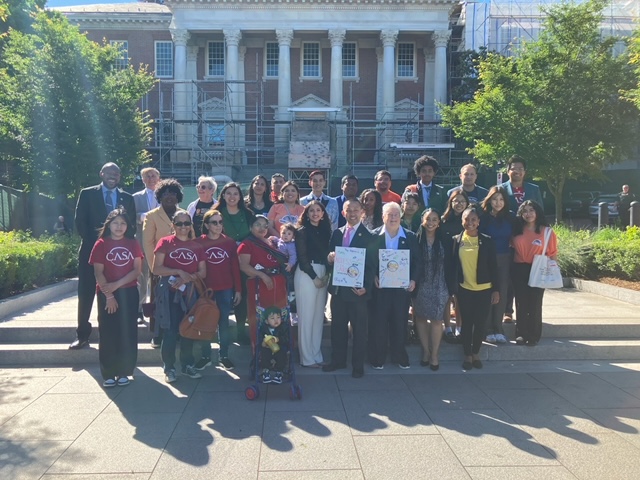Maryland Reporter
By Christopher Goins
July 22, 2013
Comptroller Peter Franchot will nudge thousands of Howard County small businesses to take advantage of additional tax credits available through the Affordable Care Act.
He joined a number of health care advocates and politicians in Columbia on Monday to announce his outreach to over 5,000 small businesses in Howard County.
The small businesses will receive a letter signed by the comptroller telling them they “may be eligible for a new tax credit to help offset your group health insurance costs.” The letters were sent out Monday, directing recipients to a tax credit calculator to find out what percentage of the tax credit they will likely qualify for.
The mailing is being paid for by the Horizon Foundation, a Howard County organization focused on health care.
“These small businesses deserve every break they could possibly get in this sluggish recovery,” Franchot said. He added that small businesses “may just not know about” the tax credits that have been available to qualifying businesses since 2010.
Vincent DeMarco, president of Maryland Health Care for All Coalition, noted the letters to small businesses are similar to a move Franchot made a few years back when he sent letters to parents of children eligible for the Children’s Health Insurance Program (CHIP), based on their tax returns.
Tax credit would average $847 per worker
Grant Lahmann, the Southern Outreach manager at Small Business Majority, said that his group projects that “the average credit per worker, nationally, would be $800, and in Maryland that number would average out to $847 per worker,” based on 2011 tax data. He said that members of Small Business Majority’s network have said that the tax credits have allowed them to make additional investments in health insurance and even more employees.
To be eligible, an employer must have fewer than 25 full-time employees, their average annual pay must be less than $50,000 in wages, and the employers must pay at least half of the premium cost.
Small businesses, including nonprofit organizations, can amend past tax returns and apply for tax credits retroactively. For tax years 2010 through 2013, the retroactive credit could cover up to 35% of premium expenses. Beginning tax year 2014, the maximum tax credit goes up to 50% of premiums, but coverage must be purchased through the Maryland Health Connection, the state health care exchange.
Howard County is test case
Rep. Elijah Cummings, D-Md., said that Franchot was participating in the pilot program in Howard County “to see how well mailings to over 5,000 small businesses” in the county “will raise awareness” with the hope that they will be able to reach businesses statewide.
“If they did decide to go statewide there’s about a 110,000 businesses that could potentially be eligible,” said Christine Feldmann with the comptroller’s office.
Cummings also said that other states are looking to Maryland for guidance because it is in the “forefront of the Affordable Care Act.”
“I have members of Congress asking me almost every week ‘How’d you do it?” Cummings said.
Credits available since 2010
Howard County Del. Gail Bates, a CPA, pointed out that the credit has been available since tax year 2010 “and yet they’re still now having to come out and advertise for it,” said Bates. “I’m guessing there are not a lot of takers.”
According to the U.S. Treasury, less than 230,000 firms signed up for the small business tax credits by mid-May 2011.
“I think that anything and everything that could be done to encourage small businesses to take advantage of the funding available under the Affordable Care Act makes sense,” said Steve Salamon of The Salamon Agency, a health insurance broker for over 20 years.
“Generally, small businesses have administrative challenges,” Salamon said, adding that they care about their employees but “the major concern is can they afford the health insurance.”
He said that in his experience the “biggest challenge” has been when employers begin evaluating the requirements and try to figure out whether they can afford to pay 50% of the employee-only cost.
Ellen Valentino, state director of the National Federation of Independent Businesses in Maryland, said that the NFIB hopes the state looks past Howard County and includes all Maryland small businesses but in a way that is cost-effective.
“The comptroller’s outreach appears appropriate and good but the issue becomes there’s so many venues on which government can be talking to all small businesses and not just ones in Howard County,” Valentino said. She added that the small business tax credit information can be tacked onto an annual notice such as unemployment insurance notices which all businesses receive.
Last modified: July 23, 2013



